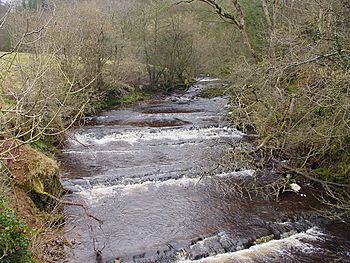River Belah facts for kids
Quick facts for kids River Belah |
|
|---|---|

River Belah from Oxenthwaite Bridge
|
|
| Country | England |
| State | Cumbria |
| Physical characteristics | |
| Main source | Millstone Rigg |
| River mouth | Blands Wath Great Musgrave |
| Length | 13.3 mi (21.4 km) |
| Basin features | |
| River system | River Eden |
| Basin size | 17 sq mi (44 km2) |
The River Belah is a cool river found in Cumbria, a county in England. Its name comes from an old English word, Belge. This word means "Roaring River," which sounds pretty exciting! The river is about 13.3 mi (21.4 km) long. It eventually joins up with the much bigger River Eden.
Contents
Where the River Belah Begins
The River Belah starts from many small streams. These streams are called sikes in this area. They flow down from the hills of north and south Stainmore. This spot is very close to the borders of County Durham and Yorkshire.
How the River Flows
The river begins as Bleaberry Beck. It tumbles down the hillside, creating many waterfalls. Then, it meets other streams like the Stow Gill Becks. After this, it officially becomes the River Belah. It flows towards the northwest. Along its journey, it passes by Oxenthwaite. More water joins the river here from Argill Beck and Powbrand Beck. Finally, after flowing past Brough Sowerby, the River Belah meets the River Eden. This happens near the village of Great Musgrave.
The Famous Belah Viaduct
A very famous bridge once crossed the River Belah. It was called the Belah Viaduct. This huge bridge was part of the Stainmore Railway. It was made of strong iron girders.
England's Tallest Bridge
The Belah Viaduct was an amazing structure. It was the highest bridge in all of England! It stood an incredible 196 feet (60 m) tall. Imagine how high that is! Sadly, this giant bridge was taken down in 1964.
River Health: Ecology
Experts check the health of rivers. The River Belah is said to have a "moderate ecological status." This means it's doing okay, but it's not in perfect health.
Challenges for the River
Sometimes, people have made the river flow faster. They did this by digging and making it wider. This can cause problems like siltation. Siltation is when too much mud and dirt build up in the river. It can also lead to the river banks wearing away, which is called bank erosion. These issues can affect the plants and animals that live in and around the river.

